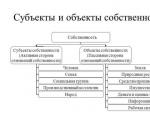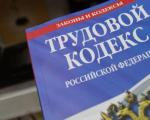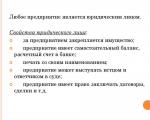Department of Automation of Technological Processes. Department of Automation of Information and Technological Processes. The Department of AITP has interconnections
Until 2009, the training of “machine gunners” was carried out by the departments of “Automation production processes"(APP) and" Automation of chemical technological processes» (AHTP), who specialized in automating the processes of production and transportation of oil and gas (department of APP) and oil and gas processing (department of AHTP).
Since September 1, 2009, the departments of APP and AKhTP have been merged into the Department of Automation of Technological Processes and Production (ATPP).
History of the department "Automation of technological processes and production"
The intensive development of the fuel and energy complex in the 1950s required the widespread introduction of automation of production processes in these industries, which could only be done with highly qualified personnel. Therefore, in accordance with the decision of the USSR government, the country's oil universities began training engineers to automate the processes of production, transport and processing of oil and gas. One of these universities was the Ufa Oil Institute. The admission of applicants for the training of automation engineers began in 1959. At the Faculty of Mining and Oil, the training of engineers in the specialty "Electrification and Automation" was started. mining”(NRA), at the Faculty of Technology - with a degree in Automation and Integrated Mechanization of Chemical-Technological Processes (NTA). Moreover, applicants who did not have work experience in their specialty were sent to work at the Tuimazaneft Oil and Gas Production Department of the Bashneft Association (NRA) and at Ufa Oil Refineries (NTA).
In 1960, to provide comprehensive work on the training of automatic engineers, the Department of Automation of Production Processes (APP) was organized, which administratively belonged to the technological faculty of the Ufa oil institute(UNI). In September 1960, Ph.D. was appointed head of the department. tech. Sciences Koltsov Alexander Alekseevich (Order No. 169 of September 21, 1960).
The department trained specialists in the following specialties:
- Electrification and automation of mining operations;
- Automation and complex mechanization of chemical-technological processes.
The first employees of the department were associate professor Malginov Lev Alekseevich, acting. Associate Professor Zeltser S.P., Senior Laboratory Assistant Taisiya Vladimirovna Prokofyeva, Senior Lecturer Galiya Khaliullovna Valeeva, and Assistant Yury Denisovich Kolovetnov, who graduated from the Ufa Oil Institute in 1961. They completed a very large educational and methodological and organizational work on the formation of the department. Alexander Alekseevich Koltsov taught all special courses for submachine gunners, participated in the organization of laboratory work, carried out a huge scientific and methodological work, from the very first days of the organization of the department he paid serious attention to research work.
One of the first to join scientific research was Dmitry Nikolaevich Karabanov, an assistant at the Department of Electrical Engineering, who intensively began to conduct research in the field of bridge measurement methods. Karabanov D.N. Graduated from the Leningrad Shipbuilding Institute. From 1966 to 1972 he was the head of the department of AMS. Together with A.A. Koltsov developed, studied in detail and tested in industrial conditions a four-wire bridge circuit, which is not critical to a change in the resistance of the wires of the communication line. This made it possible to obtain significant savings in copper, since the wires of the communication line could be used as small as desired. When calculating bridge and compensation measuring circuits, it was proposed to take into account the initial and final non-working sections of the reochords, which made it possible to significantly improve the accuracy of the calculation of measuring circuits.
Since the autumn of 1962, the department began training post-graduate students (supervisor A.A. Koltsov). The first graduate student was Dmitry Nikolaevich Karabanov, who had previously worked as an assistant at the Department of Electrical Engineering. Employees of the department were also sent to postgraduate studies at the leading universities of the country: Moscow Power Engineering Institute (MPEI), Moscow Institute of Chemical Engineering (MIHM, now MGUIE - Moscow State University Informatics and Ecology), Moscow Institute of Oil and Gas. Gubkin (now RGUNG named after I.M. Gubkin), Leningrad Electrotechnical Institute (LETI, now SPbGETU "LETI" - St. Petersburg State Electrotechnical University). Before 1972-1973 school year 7 Ph.D. theses were completed and defended. Among the graduates of the department are candidates of sciences: Vladimir Petrovich Krivosheev, Anvar Khalyafovich Mukhamedzyanov, Lev Nikolaevich Latyshev, Alexander Alexandrovich Tyukavin, Yuri Denisovich Kolovetnov, Galiya Khaliullovna Valeeva.
Shalovnikov E.A., Safonov V.V., Koltsov A.A., Safarov M.R., Guzeev B.V.
In those years, the scientific direction of the department was the theory and practice of electrical measurements of electrical and non-electric quantities, which was in good agreement with academic disciplines departments: theoretical foundations electrical engineering, industrial electronics, technological measurements and instruments, automation of production processes.
Under the guidance of Associate Professor A. A. Koltsov, the staff of the department L. N. Latyshev, A. I. Bespalov and others developed an original installation for determining the coordinates of underwater pipelines, which does not require the participation of divers and allows you to work both on fast-flowing rivers and in winter. ice time. The cost of the transition survey has been reduced by approximately 10 times.
The installation was successfully operated during the survey of crossings over the Volga, Dnieper, Belaya and other rivers.
The results of research in the field of electrical measuring balancing circuits were fruitful. With the participation of graduate student D.N. Karabanova developed narrow-limit single-point and multi-point bridges, and the applicant G. Kh. Valeeva developed original narrow-limit potentiometers with a temperature variator.
Big economical effect was obtained from the work of Yu. D. Kolovetnov on measuring the temperature in a well during its heat treatment. Vitaly Semenovich Grib developed deep-seated equipment with photoelectric converters. A. A. Koltsov, on the basis of many years of studying electrical measuring balancing circuits, developed a method of conversion coefficients based on the concepts of a current balancing node and a voltage balancing circuit. This made it possible to generalize the previously scattered factual material on the most important sections of electrical measuring technology, to derive the previously unknown general condition balance of various structures. The fundamentals and possibilities of this method were later described in a doctoral dissertation, which A. A. Koltsov defended in 1971 at the Leningrad Polytechnic Institute.
The staff of the department has always faced a difficult task - to prepare new lecture courses and create laboratories. Despite great difficulties, the department successfully solved them. A lot of work on the creation of the laboratory complex was carried out by A.A. Koltsov, L.A. Malginov, Yu. D. Kolovertnov, F. P. Kuzmin, Art. laboratory assistant T. V. Prokofieva, laboratory assistant M. V. Geleverya and educational master B. I. Dementiev. A. Bespalov, A. Bogdanov, L. Latyshev, A. Tyukavin, A. Cherek and others, students of machine gunners, provided serious assistance in setting up laboratory work.
In March 1963, Fedor Pavlovich Kuzmin, who had previously worked at the Tuimazaneft Oil and Gas Production Department of the Bashneft Association, was hired as head of the laboratory, where he was engaged in the introduction of oil field automation equipment. Occupying the position of head of the laboratories of the department of AMS, F.P. Kuzmin began to teach a course on automation of production processes for students of the specialty 0634 "Electrification of Mining", devoting a lot of time to creating a laboratory for this course.
The workload at the department increased rapidly and in 1963, after graduating from the Ufa Oil Institute, Dolmatov Lev Vasilyevich, Bogatykh Konstantin Fedorovich, Ayazyan Goerun Kachperunovich, Imaev Damir Khabibovich and Grib Vitaly Semenovich were left to work at the department.
It was obligatory for teachers to attract students-machine gunners to the student scientific society. As a result of this, 4-8 students worked with each teacher during extracurricular time, who made presentations at annual student conferences and after graduation were proven candidates for continuing research at the department. So, immediately after graduating from the institute in 1965, Anatoly Ivanovich Bespalov was admitted to graduate school, being the fourth graduate student of A.A. Koltsov. Recall that the first graduate student was D.N. Karabanov. The second in terms of admission was Valery Mikhailovich Sapelnikov, who graduated with honors from the Ryazan Radio Engineering Institute in 1961 and until August 1964 worked at the computer center of the Bashkir State University.
Due to the large volume and diversity study load certain difficulties were created in improving the educational, methodological and scientific work of the department. For this reason, in October 1965, on the basis of the decision of the Council of the Institute dated September 25, 1965, a subject-methodical commission (PMC) in the specialty "Automation and complex mechanization of chemical-technological processes" (AKMHTP) was separated from the department of AMS. Bogatykh Konstantin Fedorovich was appointed chairman (order No. 382 dated 10/29/65). The PMK then consisted of teachers A. D. Zholobov, G. K. Ayazyan, D. Kh. Imaev, L. V. Dolmatov, M. G. Akhmadeev, A. F. Davydov, V. P. Krivosheev, L. K Kabanova, A.A. Kuznetsova. Conducting laboratory classes was provided by the educational master Boris Ivanovich Dementiev and Art. laboratory assistant Taisiya Vladimirovna Prokofieva. It was the youngest team of the institute both in terms of age and work experience.
For a relatively short period, the heads of the subject commission of the ACMCC were appointed:
- Rich Konstantin Fedorovich (1965),
- Dolmatov Lev Vasilyevich (1966),
- Davydov Alexander Fedorovich (1967),
- Kuzmin Fedor Pavlovich (1968),
- Davydov Alexander Fedorovich (1969).

Teacher of the department V. A. Kochinashvili (third from left) with a group of students at practical classes
In 1969, in order to improve educational and methodological work with students, the Faculty of Automation of Production Processes (FAPP) was formed. The first dean was appointed Associate Professor of the Department of Electrical Engineering, Ph.D. tech. Sciences Kochinashvili Vladimir Antonovich.
In terms of academic performance, FAPP has always been among the leading faculties of the institute. Many students passed exams only with "good" and "excellent". The first Lenin scholarship holders were M.R. Safarov, V. A. Shabanov, G. P. Alekseev.
At the same time with academic work science developed at the faculty. Main directions of scientific research: information and measuring equipment (supervisor — Doctor of Technical Sciences A. A. Koltsov), mathematical modeling and optimization of chemical and technological processes (supervisor — associate professor V. P. Krivosheev) and improving the reliability of power supply oil industry(supervisors - associate professors A. M. Valeev and V. A. Kochinashvili).

On the basis of PMK AKMHTP in 1970, the Department of Automation and Integrated Mechanization of Chemical-Technological Processes was established. Head new department became a candidate of technical sciences, associate professor V.P. Krivosheev. From 1968 to 1972, graduates of 1968 - 1972 years of release joined the PMK, and later the department of AKMHTP. By 1972, PMK AKMHTP was renamed into the Department of Chemical Technology Automation (AKhTP), which it retained until September 2009. Through the efforts of teachers and staff of the department, three new laboratories were created: on the basics of automation, technological measurements and instruments in Ufa and an automation laboratory in Sterlitamaksky OTP.
Scientific work began to be successfully carried out at the department. The main scientific direction of the department was mathematical modeling, optimization and development of control systems for chemical and technological processes, in particular, the process of distillation and production of polyethylene. Studies were carried out to determine the salt content in boiler water and oil products, algorithms were developed for calculating some technical and economic indicators of the operation of oil refineries.
In 1970 - 1984, as well as in 1998, educational laboratories were created and reconstructed:
- Technological measurements and instruments (TYPE),
- Automation of technological processes (ATP),
- Modeling and optimization of processes,
- Fundamentals of automation,
- Technical means of automation. Devices for the quality and composition of substances.
A package of software products and models of laboratory work has been developed.
Teachers and employees of the department took part in the creation: Ayazyan G.K., Verevkin A.P., Dadayan L.G., Dinkel V.G., Dementiev B.I., Borisov A.N., Vasilenko E.T. (head of laboratory), Kabanova L.K., Krivosheev V.P., Kobyakov A.I., Maslennikov G.V. (training master), Mukhamedzyanov A.Kh., Nagumanov Kh.G., Kazantsev V.N. (engineer), Alferov M.T. (training master)
The submachine gunners in the student construction teams (SSO) showed themselves very well. They were not only active fighters, but also leaders. G. Bukaev, X. Nagumanov, S. Pronina, G. Alekseev, R. Bakhtigareev, R. Taychinov, R. Gabdrakhmanov worked as commanders and commissars of the zonal detachments "Leninets", "Energy", "Turkmenia", "Communication", and student S. Pronina - commissioner of the republican headquarters of the MTR BASSR.
On the account of the MTR fighters - students of the FAPP, a large number of remarkable deeds were built: residential buildings, machine repair and other workshops, power lines, telephone lines and roads. The fighters did a lot of agitation and mass work among the population, gave lectures, gave concerts. Joint work in the SSO hardened and rallied the students, taught them to overcome difficulties.
Teachers of the department Yu. D. Kolovertnov, G. Kh. Valeeva, T. N. Prokofieva, Z. V. Baranova, top row: A. I. Bespalov, V. S. Grib
In 1984, the Department of Computing Technology and Engineering Cybernetics (VTIK) was created from the composition of the department of AKhTP and on its basis, which was also included in the faculty of the APP. Part of the staff of the department of AKhTP moved to work at the department of VTIK: Pisarenko E.V., Kirlan L.D., Belozerov E.S., Gnatova I.V., Khorobrov V.R., Ivanov V.I., Mukhamadeev I. G.
In 1986, a branch of the department of AKhTP was organized on the basis of the instrumentation and control department of the OL NUNPZ with the participation of Ph.D. Munirova Yu.M. (Order No. 96-1 dated 09/23/86).
In 1986-1987, the UNI organized (since 01/01/87) the ONIL for metrological support of methods for testing the composition and properties of oil and petroleum products at refineries (order No. 1171/795 dated 12/18/86), which was headed by Mukhamedzyanov A.Kh.
2000 - on the basis of the department from 15.03.2000 on a voluntary basis, the Coordinating and Training and Consulting Center (KUKTs) was opened on the design, operation and examination of automated process control systems, which operated on the basis of licenses from the Gosgortekhnadzor of Russia.
2003 - in accordance with complex agreement between USPTU and Interregional JSC "Nefteavtomatika" and the order of the rector of USPTU on the basis of the departments of AKhTP and VTIK, an industry laboratory was organized on the problems of automation of the management of oil production and transport processes.
In the fall of 2009, there was a merger of the departments of APP and AKhTP into the department of ATPP. Doctor of Technical Sciences Professor Alexander Pavlovich Veryovkin became the head.
The geography of distribution of our graduates is the entire territory of the former Soviet Union and far abroad countries. Many have held and hold responsible positions in the Russian government and in production.
A number of graduates have worked and are still working in the administrative bodies of the Russian Federation and the Republic of Bashkortostan.
Over 70 graduates of the department defended their dissertations, 15 candidates and doctors of technical sciences now teach at the department. Among the graduates of the doctor of sciences: A.A. Koltsov, Yu. D. Kolovertnov, G. Yu. Kolovetnov, V.P. Krivosheev, A.A. Tyukavin, V.M. Sapelnikov, V.N. Fedorov, A.S. Nadrshin, Kobyakov A.I., A.Kh. Mukhamedzyanov, A.P. Verevkin, V.F. Galiakbarov, I.G. Arslanov.
Currently, the staff of the department of ATPP conducts a lot of educational and methodological work. Since 2000, more than 50 teaching aids and over 300 others educational and methodological developments. Over the past years, teachers and staff of the ATPP department have published more than 30 interuniversity scientific and thematic collections, published more than 1200 scientific papers, received more than 250 copyright certificates for inventions and patents.
- development of methods and software technical means obtaining information on quality indicators and technical and economic indicators and decision-making algorithms for managing oil refining and petrochemical facilities;
- development of information management systems for the oil and oil refining industry;
- research and development of intellectual means and control systems;
development of simulators and simulators for training of technological personnel.
For the period 1977 - 2012 more than 30 developments of the department staff have been introduced into production, more than 300 scientific papers have been published, more than 14 patents and copyright certificates have been received.
The department successfully operates full-time and part-time postgraduate studies, in which from 3 to 6 people study annually. Training of highly qualified personnel at the department is carried out in the scientific specialties 05.13.06 - "Automation and control of technological processes and production", 05.11.16 "Information and measuring systems".
In 1992, a self-supporting research laboratory (KhNIL) "Information and Measuring Systems" (IMS) was created at the department.
In 1998 at VI international exhibition"Gas. Oil. Technologies” showcased the stand-alone pressure gauge-thermometer PGA and the RTP-4 process parameter recorder developed at the KhNIL “IIS”.
Main scientific directions departments and solved scientific problems:
- development of pressure, temperature, force sensors as elements of control systems for automation of the oil and gas industry;
- development of measuring transducers for the parameters of technological processes in the oil and gas industry;
- research and development of intelligent control systems for oil and gas production.
And production is not an easy specialty, but a necessary one. What does she represent? Where and on what can one work after receiving a professional degree?
general information
Automation of technological processes and production is a specialty that allows you to engage in the creation of modern hardware and technical and software tools who can design, research, conduct technical diagnostics and industrial testing. Also, a person who has mastered it will be able to create modern systems management. Specialty code of automation of technological processes and production - 15.03.04 (220700.62).
Based on it, you can quickly find the one you are interested in and see what they are doing there. But if we talk about it in general, then such departments train specialists who can create modern automated objects, develop the necessary software and operate them. This is what automation is
The specialty number was given earlier in the form of two different numerical values because it was introduced new system classification. Therefore, first it is indicated how the described specialty is designated now, and then how it was done earlier.
What is being studied

The specialty "automation of technological processes and production of free software" is during training a set of tools and methods that are aimed at implementing systems that allow you to manage ongoing processes without direct human participation (or the most important questions remain for him).
The objects of influence of these specialists are those areas of activity where complex and monotonous processes are present:
- industry;
- Agriculture;
- energy;
- transport;
- trade;
- the medicine.
The greatest attention is paid to technological and production processes, technical diagnostics, scientific research and production tests.
Detailed information about training
We examined what is being studied by those wishing to receive the described specialty, in general. And now let's detail their knowledge:
- Collect, group and analyze the initial data necessary for design technical systems and their control modules.
- Evaluate the significance, prospects and relevance of the objects that are being worked on.
- Design hardware and software complexes of automated and automatic systems.
- Monitor projects for compliance with standards and other regulatory documents.
- Design models that show products at all stages of their life cycle.
- Choose software and automated production tools that best suit a particular case. And also systems of tests, diagnostics, management and control supplementing them.
- Develop requirements and rules for various products, their manufacturing process, quality, conditions of transportation and disposal after use.
- Perform and be able to understand various design documentation.
- Evaluate the level of defects in the created products, identify its causes, develop solutions that will prevent deviations from the norm.
- Certify developments, technological processes, software and
- Develop instructions for the use of products.
- Improve automation tools and systems for the execution of certain processes.
- Maintain process equipment.
- Set up, adjust and regulate automation, diagnostics and control systems.
- Improve the skills of employees who will work with new equipment.
What positions can you expect

We have examined how the specialty "automation of technological processes and production" differs. Work on it can be carried out in the following positions:
- Apparatus-operator.
- Circuit engineer.
- Programmer-developer.
- Systems Engineer.
- Operator of semi-automatic lines.
- Engineer of mechanization, automation and automation of production processes.
- Computing system designer.
- Engineer measuring instruments and automation.
- Materials scientist.
- Electrical Technician.
- Developer automated system management.
As you can see, there are quite a few options. Moreover, it should also be taken into account that in the process of studying, attention will be paid to a large number programming languages. And this, accordingly, will provide ample opportunities in terms of employment after graduation. For example, a graduate can go to a car factory to work on an assembly line for cars, or to the field of electronics to create microcontrollers, processors and other important and useful elements.
Automation of technological processes and production is a complex specialty, implying a large amount of knowledge, so it will need to be approached with all responsibility. But as a reward, you should accept the fact that there are ample opportunities for creativity.
Who is this path best for?
Those who have been doing something similar since childhood are most likely to become successful in this field. For example, he went to a radio engineering circle, programmed on his computer, or tried to assemble his own 3D printer. If you haven't done any of this, then you don't need to worry. chances of becoming a good specialist yes, it just takes a lot of effort.
What you need to pay attention to first

Physics and mathematics are the basis of the described specialty. The first science is necessary in order to understand the ongoing processes at the hardware level. Mathematics, on the other hand, allows you to develop solutions for complex problems and create models of non-linear behavior.
When getting acquainted with programming, many people, when they are just writing their “Hello, world!” Programs, it seems that knowledge of formulas and algorithms is not necessary. But this is an erroneous opinion, and the better a potential engineer understands mathematics, the greater heights he will be able to achieve in the development of a software component.
What if there is no vision for the future?

So, the training course has been completed, but there is no clear understanding of what needs to be done? Well, this indicates the presence of significant gaps in the education received. Automation of technological processes and productions is, as we have already said, a difficult specialty, and it is not necessary to hope that all the necessary knowledge will be given at the university. A lot of things are transferred to self-study both in a planned mode and implying that a person himself will become interested in the subjects studied and devote enough time to them.
Conclusion

Here we have considered in general terms specialty "automation of technological processes and productions". Reviews of specialists who have graduated from this area and are working here say that, despite the difficulty initially, you can claim a pretty good job. wages starting from fifteen thousand rubles. And over time, having gained experience and skills, an ordinary specialist will be able to qualify for up to 40,000 rubles! And even this is not the upper limit, because for literally brilliant (read - those who have devoted a lot of time to self-improvement and development) people, it is also possible to receive significantly larger amounts.




